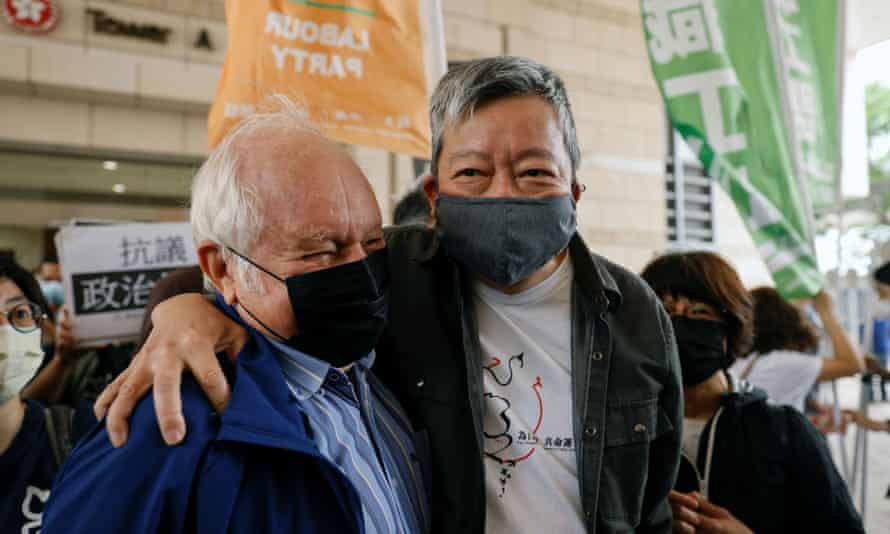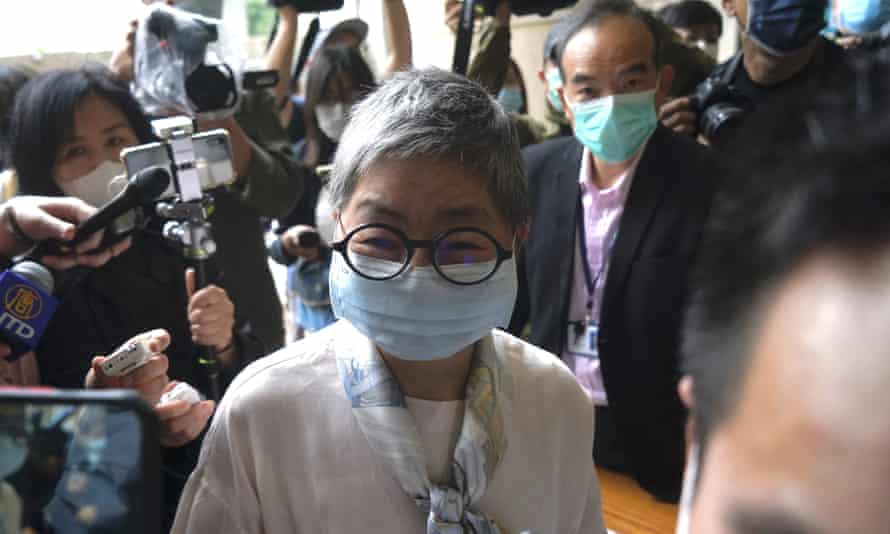A Brief Colonial History Of Ceylon(SriLanka)
Sri Lanka: One Island Two Nations
A Brief Colonial History Of Ceylon(SriLanka)
Sri Lanka: One Island Two Nations
(Full Story)
Search This Blog
Back to 500BC.
==========================
Thiranjala Weerasinghe sj.- One Island Two Nations
?????????????????????????????????????????????????Saturday, April 17, 2021
Hong Kong pro-democracy figures given jail terms of up to 18 months
Media mogul Jimmy Lai and veteran activist Lee Cheuk-yan each sentenced to 14 months over protests
Hong Kong pro-democracy activists are handed suspended sentences – video
Helen Davidson in Taipei @heldavidson-Fri 16 Apr 2021
A court in Hong Kong has handed down a mixture of prison and suspended sentences to 10 of the territory’s most prominent pro-democracy figures, including reformers, politicians and a media mogul, some veterans of the transition from British rule in the 1990s.
The prison sentences for organising or participating in an unauthorised assembly – traditionally a low-level offence attracting fines – are a highly symbolic blow to the pro-democracy movement, which has been targeted by authorities bent on removing all opposition to Beijing.
Those sentenced included Jimmy Lai, a 72-year-old billionaire media mogul and democracy activist, and veteran labour leader and outspoken organiser Lee Cheuk-yan, 64. Fellow defendant Martin Lee, 82, known as the father of democracy, had never faced trial until this year. Nor had Margaret Ng, 73, a former legislator and highly respected lawyer who in a powerful speech on Friday told the court the law was supposed to protect the people’s rights.
The sentences related to two rallies held in August 2019. Lai and Lee Cheuk-yan were each sentenced to 14 months in jail. The activist “Long Hair” Leung Kwok-hung received the longest sentence, of 18 months. Martin Lee and Margaret Ng were given 11 and 12 months respectively, but both sentences were suspended for two years.
The former Democratic party chairman Yeung Sum, 73, was given a suspended sentence of eight months.
Outside court, the 69-year-old lawyer Albert Ho, who was given a 12-month sentence suspended for two years, said the sentences were “shocking and totally unthinkable”. He said the judge treated any act of assembly without police approval as “disruption to the social order”. Ordinarily such convictions would only attract a fine, Ho said, but instead the judge set sentences at 18 months before reductions.
Asked how he felt about the verdict, Martin Lee said only that he was going home for a rest.
Lai, who is facing other charges including under a draconian national security law imposed by Beijing last year, has been detained on remand since late last year.
Prosecutors laid a further national security charge against Lai on Friday, accusing him of conspiracy to collude with foreign forces, and another criminal charge of conspiracy to pervert the course of justice. Both reportedly relate to the case of Andy Li, an activist who was caught by Chinese authorities attempting to flee Hong Kong for Taiwan by boat.

Lai’s repeated arrests and related raid of his newsrooms have drawn international condemnation. Lee is also facing a number of other protest-related cases this year, and had previously told the Guardian he expected to be jailed.
During mitigation, Ng told the court that laws should “give protection to rights, not take them away, especially in Hong Kong where structural democracy is absent”.
Ng said there was “no right so precious to the people of Hong Kong as the freedom of expression and the freedom of peaceful assembly”.
Dozens of people queued to enter the West Kowloon court on Friday morning, including foreign diplomats and former Hong Kong legislators.
Outside the court the defendants held up their hands to signal “five demands, not one less”, the rallying cry of the movement. Lee Cheuk-yan urged Hong Kong people to “hold on”.
“I’m ready to face the penalty and sentencing and I’m proud that I can walk with the people of Hong Kong for this democracy,” he said. “We will walk together even in darkness.”

Prosecutors had accused the individuals of organising or participating in unauthorised assemblies on two dates in August 2019, at the height of the mass pro-democracy protests that brought the city to a standstill.
Entering his plea, Lee Cheuk-yan told the court the group had done nothing wrong, and “history would absolve us”.
The prison sentences were quickly condemned. “The prosecutions, convictions and heavy custodial sentences of these dignified and experienced democrats, for their peaceful role in a protest sends a chilling message to Hong Kong citizens that free expression and peaceful protest may result in prison sentences,” said Schona Jolly QC, the chair of the Bar Human Rights Committee of England and Wales.
Amnesty International’s Asia-Pacific regional director, Yamini Mishra, said the convictions were against international law. “The wrongful prosecution, conviction and sentencing of these activists underlines the Hong Kong government’s intention to eliminate all political opposition in the city,” Mishra said.
Chris Patten, a former British governor of Hong Kong, said the cases saw “some of the most distinguished of the city’s peaceful and moderate champions of liberty and democracy placed in Beijing’s vengeful sights”.
“The CCP [Chinese Communist party] simply does not understand that you cannot bludgeon and incarcerate people into loving a totalitarian and corrupt regime,” he said.
More than 10,200 people have been arrested in relation to the mass protests of 2019, which began as opposition to a proposed bill allowing extradition to China but evolved into broader pro-democracy movement. There were frequent violent confrontations between protesters and police, who were accused of brutality.
A subsequent crackdown by authorities, using existing criminal laws, the national security law introduced by Beijing in 2020, and anti-pandemic laws have ended mass protests, and more than 100 people have been arrested under suspicion of national security offences, including much of the opposition camp.
This week the government gazetted amendment bills to overhaul the election system, introducing police vetting for candidates, outlawing calls to boycott the vote, and limiting the number of seats opposition candidates could feasibly hold.

